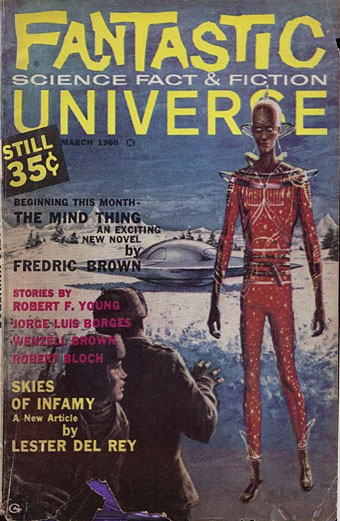
Cover art by Ed Emshwiller.
More Borges. While checking the details of yesterday’s post I discovered this oddity, an American SF magazine that published a two-page Borges story in March 1960, and put the author’s name on the cover even though few of the magazine’s readers would have heard of him at the time. The issue, which turned out to be the final one, lacks an editorial page so there’s no indication as to how the story found its way there. The story itself concerns an encounter in modern-day Spain between two men, one of them an established magician (in the occult sense), the other a neophyte hoping to gain similar powers. The piece is as much a moral fable as a work of fantasy, and as such appears out of place in a magazine with flying-saucer artwork on its exterior and a Virgil Finlay illustration inside (not for the Borges, unfortunately).

I thought at first that I might not have read this one before, the title wasn’t familiar but the story was one I recognised immediately. I was also surprised to find that I have it in four different collections under different titles, and with two of the printings appearing at first to disguise the author. In Black Water: An Anthology of Fantastic Literature (1983), edited by Alberto Manguel, the story appears as The Wizard Postponed, with the writer given as “Juan Manuel”; in The Book of Fantasy (1988), an updated version of the Antología de la Literatura Fantástica edited in 1940 by Borges, Adolfo Bioy Casares and Silvina Ocampo, the same piece appears as The Wizard Passed Over, with the author credited as “Don Juan Manuel”. The latter turns out to be the original author, a medieval Spanish writer, although “original” here is a debatable term when the story is Manuel’s adaptation of a piece he found in a book of Arabian tales. Borges rewrote this together with several other short reworkings which appear in the Etcetera section at the end of A Universal History of Infamy, its third appearance on my shelves (once again as The Wizard Postponed).
The fourth appearance is in the Collected Fictions (1998), or the cursed volume as I tend to think of it. I often feel bad about traducing the efforts of translator Andrew Hurley every time Borges is mentioned here but this story provides a good example of why his work is so unsatisfying to readers familiar with the stories from older editions. In its original Spanish the story is El brujo postergado, a short title for which The Wizard Postponed or The Wizard Passed Over would seem like reasonable analogues. Hurley expands this to The Wizard That Was Made to Wait, a lumbering, graceless phrase that’s typical of the lumbering gracelessness elsewhere in Collected Fictions. These tin-eared translations are the ones approved by the Borges estate so they’re present in all the reprints of the past 20 years. Fortunately for readers, most of Borges’ books were widely reprinted in English translations that the author approved, and some of which he even assisted with. Reject the conjurations of maladroit sorcerers, that’s my advice.
Previously on { feuilleton }
• The Immortal by Jorge Luis Borges
• Borges on Ulysses
• Borges in the firing line
• La Bibliothèque de Babel
• Borges and the cats
• Invasion, a film by Hugo Santiago
• Spiderweb, a film by Paul Miller
• The Library of Babel by Érik Desmazières
• Books Borges never wrote
• Borges and I
• Borges documentary
• Borges in Performance

Agree on the gracelessnes of Hurley’s translations. I’m glad to have his book, just to have a convenient source for some version of “everything”, but it’s my old copies of FICCIONES, THE ALEPH, and so on that I turn to for actual reading.
I should add that Fantastic Universe (edited at that time by Hans Stefan Santesson as I recall) was quite hospitable, especially at “the back of the book” as we might say, to fabulist pieces in the mode of “The Rejected Sorcerer”. And as for Borges’ history in genre magazines, as far as I know the earliest English translation of a Borges story is Anthony Boucher’s translation of “The Garden of Forking Paths”, in Ellery Queen’s Mystery Magazine , August 1948. Boucher (real name William Anthony Parker White) was a writer of science fiction and mystery stories, and the first editor of The Magazine of Fantasy of Science Fiction, as well as a prominent review of crime fiction as “H. H. Holmes”.
I can imagine Death and the Compass finding a place in a mystery magazine as well.
I’ve got a collection of Boucher’s own stories, The Compleat Werewolf. I was always impressed by They Bite, a story where he drops the humour and goes for straightforward horror. I ought to read it again…
In fact this short story is a Borges “appropiation” of a Spanish classic tale by Don Juan Manuel (1282-1348), from his “Book of Patronio” (in Spanish: “Libro de los ejemplos del Conde Lucanor y de Patronio”, 1330-1335) , one of the fundational classics of Mediaeval Spanish literature with Arabic influences. It´s a common mistake to quote Borges as the author because the Argentinian genius included the tale in his “A Universal History of Infamy” and in other anthologies. But actually is one of the firsts fantasy fictions in Spanish literature and included too in a long number of anthologies on this subject. The original Spanish title is “El brujo postergado”.
Yes, “Boucher” was most definitely a writer of fantasy and horror as well as sf and crime fiction of several stripes.
Also notable in the appearance of the Borges vignette in the last issue of FU (that evocative abbreviation), not infrequently referred to during its run as “the Poor Man’s F&SF” in the parlance of its era, is that the translation is not credited…I’ve tended to wonder if editor Santesson did the translation himself.
Meanwhile, frequent Borges translator Donald Yates was a contributor to EQMM, as well, and his version of “Death and the Compass” was reprinted in EQMM in 2008. Another hearty condemnation of the current atrocious Penguin translations from me…the Borges/Di Giovanni translations default to the best by me, and as far as I know only the continuing resentment between Di Giovanni and the Borges family keeps them from being reprinted…Alistair Reid, one of my professors in my undergrad years, being another who’s done good work in this wise, and his BORGES: A READER, collects translations for several translators including himself, all that much better than the hopeless Penguin fellow.
“Boucher”, by the way, was famously reviewing primarily crime fiction for the NEW YORK TIMES under his most famous pseudonym while also reviewing as “Holmes” (after the famous Chicago exposition mass-murderer) simultaneously for the NY HERALD-TRIBUNE. A very busy man.
One of my favourite parts of Borges’ Personal Anthology is the editors’ note at the end where Anthony Kerrigan and Alistair Reid swap letters in which they doubt their own identities and that of the mysterious “Borges” whose work they believe they’ve been translating.
Incidentally, I don’t know why the comments on this post keep getting held in moderation. The discussion settings aren’t set up to do that so it may be the spam filter. I’ll look into it.
Jesús: Your comment was caught as spam for some reason. Sorry about that.
I noted the Spanish origin of the story in the post above. The editor’s note in the Alberto Manguel collection also discusses this a little.